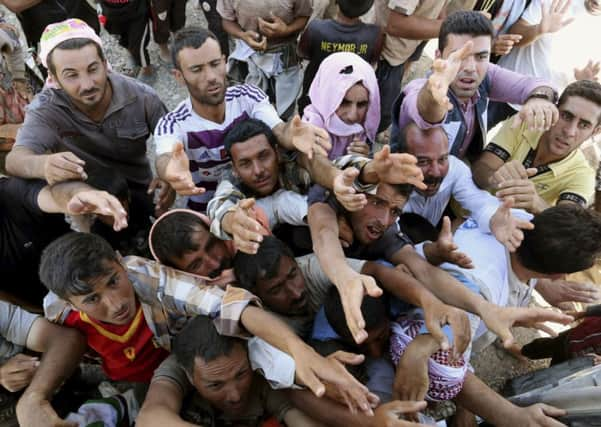Grant Woodward: Britain has a moral duty to act over Iraq slaughter


Now, two decades later, we risk repeating those same mistakes in the Middle East. Wringing our hands on the sidelines as men, women and children are butchered with impunity by a marauding army of bloodthirsty fanatics.
The crucial difference is that this time the consequences are likely to extend far beyond the scene of the slaughter. This is no Cold War era Domino Theory paranoia. The idea of Islamic State extremists establishing a Caliphate in territory bordering Turkey, Iran and Syria chills the blood.
Advertisement
Hide AdAdvertisement
Hide AdDerided for its readiness to embroil itself in Middle East conflicts over the last decade or more, there should be no criticism of the United States for now stepping up to the plate. Its air strikes have allowed scores of marooned Yazidi civilians under threat of extermination by IS fighters and worn down by a lack of food to escape from Mount Sinjar.
US Marines and special forces are now in the region to assess options for a potential rescue of the rest. Britain, meanwhile, drops bottles of water and deploys a token handful of SAS troops to the area to “gather intelligence”.
Under pressure from his MPs, David Cameron has at least returned from his holiday in Portugal a day early. Presumably someone told him about the Tory backbenchers distributing a newspaper cartoon featuring rows of dead refugees lying on the ground and ending with a pot-bellied Prime Minister relaxing on a beach towel.
Despite this, he continues to resist the clamour to recall Parliament, while officials brief that putting “boots on the ground” in any meaningful sense simply isn’t an option.
Advertisement
Hide AdAdvertisement
Hide AdIt’s some contrast to the decisive leadership shown by Margaret Thatcher during the Cold War – or in the momentous hours which followed Argentina’s invasion of the Falklands. In that instance, rather than negotiate, she sent warships and seized the islands back in 74 days. “When you’ve spent half your political life dealing with humdrum issues like the environment, it’s exciting to have a real crisis on your hands,” she noted.
Iraq veteran Colonel Tim Collins has been fiercely critical of previous involvement in the region, lamenting the manner in which the UK and US poured “blood and treasure” into overseas campaigns which seemed to have “no ending and no goal”, including those he fought in. This time even he is insisting that unless Britain acts, ancient civilisations will be extinguished.
Unlike Collins, of course, David Cameron has an electorate to consider. Yet it is simply staggering to think that a nation that acted to oust Saddam is now showing such catastrophic complacency as whole peoples are being systematically wiped off the face of the planet.
Britain’s previous chaotic and confused entanglements in Iraq make it understandable that the tide of public opinion is against full military involvement, but this is likely to turn as the humanitarian crisis escalates. And the key difference is that this time the enemy is not some chameleon-like band of insurgents who will melt back into the crowds or secrete themselves in remote villages. The Islamic State is a clearly identifiable army that has a recognised chain of command and fights under one flag.
Advertisement
Hide AdAdvertisement
Hide AdRescuing scattered groups of Iraqis will not be enough. Make no mistake, IS will not stop until it has eliminated the country’s Christians, Kurds and all others who stand in its way. And lurking alongside the seasoned jihadis in its ranks are young extremists from the West who will gladly return home to spread the poison here.
Last week a black flag similar to those fluttering over IS-captured territory in Iraq and Syria was spotted flying at the gates of an east London housing estate before finally being taken down by a local nun. Pictures on Twitter a few days ago showed IS supporters handing out leaflets in central London calling on Muslims to pledge religious allegiance to their cause.
It is the time for bold leadership in the form of decisive military intervention that delivers a hammer blow to Islamic State aspirations and creates a window of opportunity in which the Kurds, who have no territorial ambitions beyond their own region, can be armed and trained to defend themselves. Talks also need to be held with those Sunni tribes who can be persuaded that their future interests are best served as part of a democratic Iraq rather than reluctant participants in the Middle East equivalent of Pol Pot’s Year Zero.
As the hours and days tick past, the death toll rises and the threat to world order mounts. As a nation that pledges to uphold democracy and support human rights around the world, Britain has a moral duty to act. More than that, self-interest dictates that we simply cannot afford to stay on the sidelines.